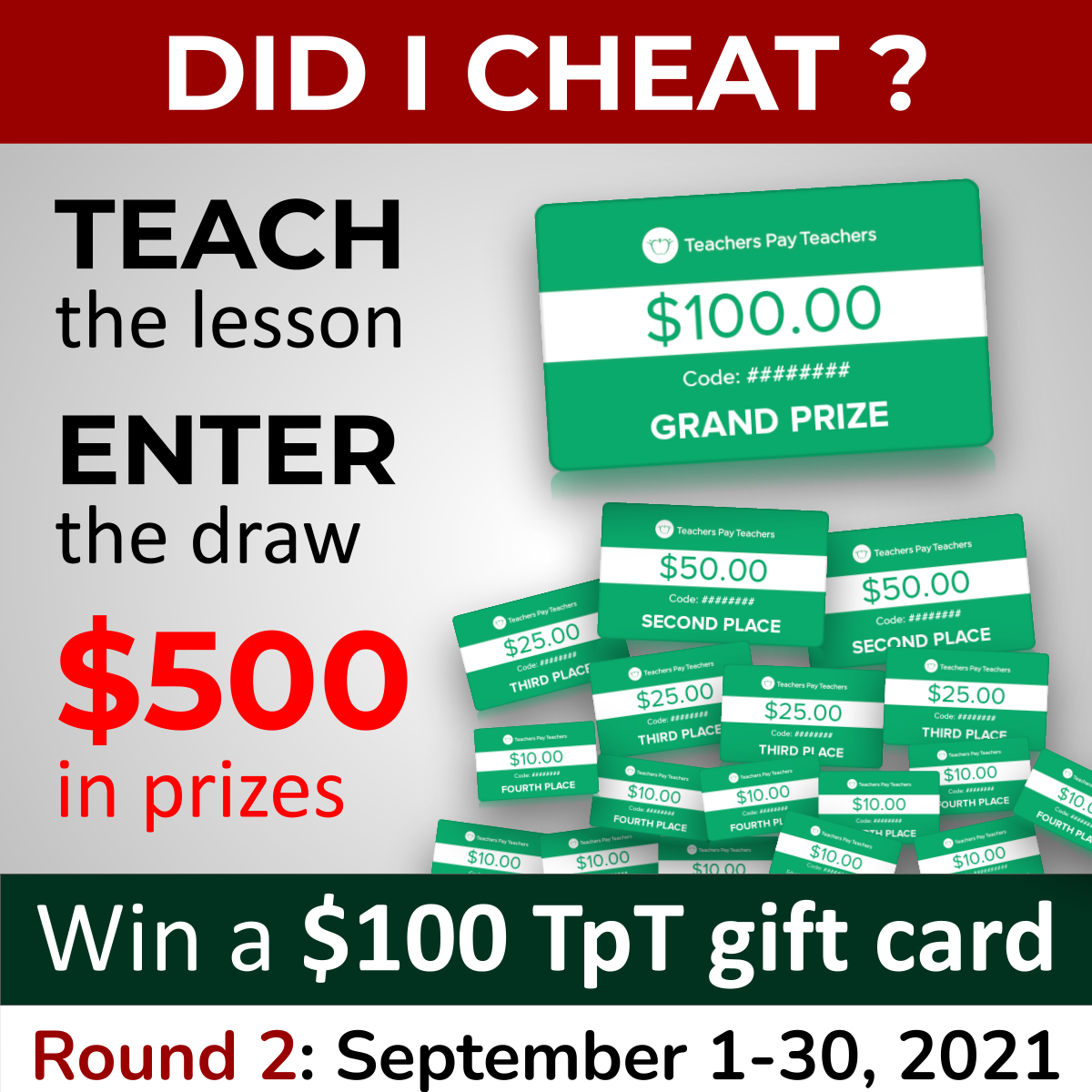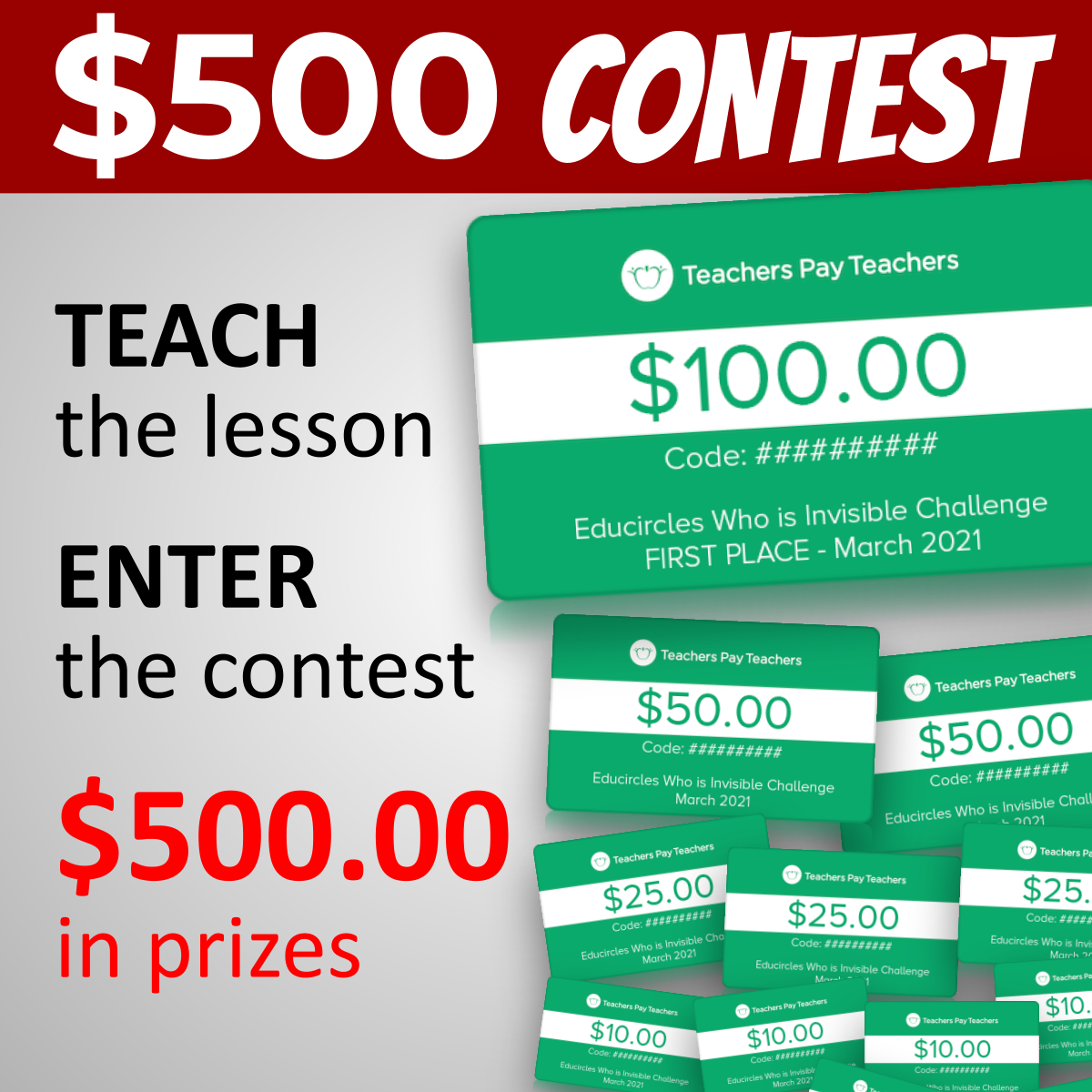FREE Critical Thinking Lesson for Middle School / High School:
Did I Cheat?
Quick Links:
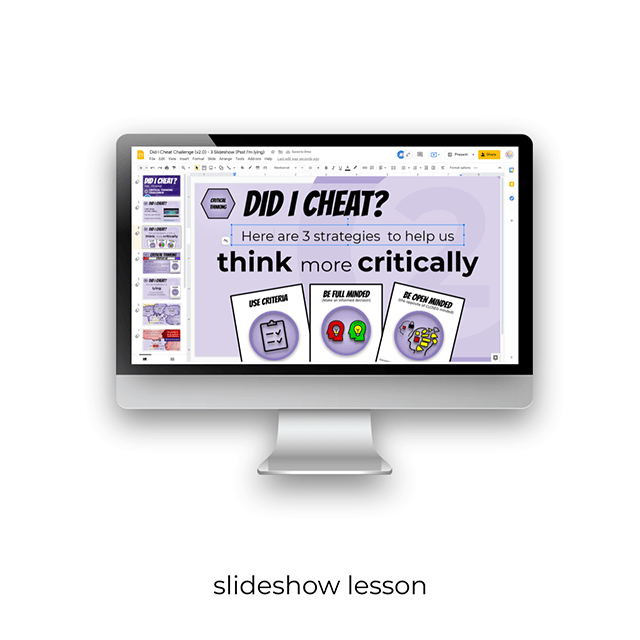
Did I Cheat?
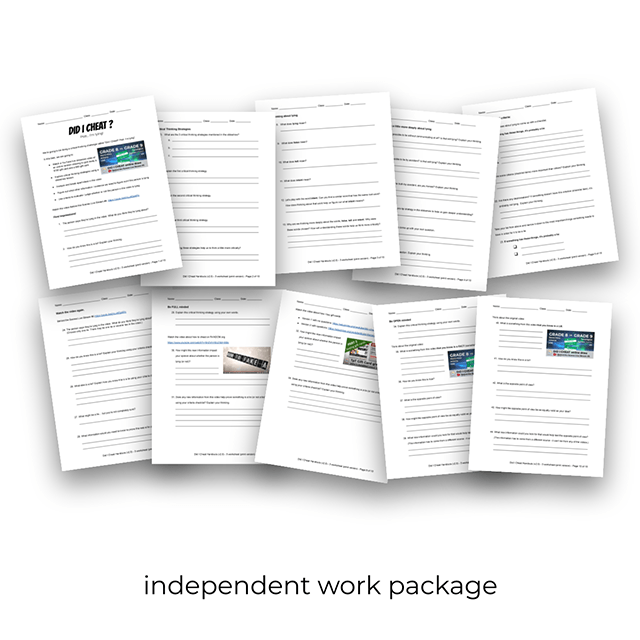
Did I Lie?
Introduction video for students
NEW! THIS WELCOME VIDEO EXPLAINS THE TASK TO STUDENTS
It goes over:
- 2:03 Why are we doing this?
- 3:00 Why does the video in the challenge look like it’s talking to teachers?
- 4:34 What do we do? (Look for clues and inconsistencies) – ANALYSIS
- 5:15 Quick overview of the mini lesson on 3 critical thinking strategies
- 5:39 Using a student-created checklist to see if I’m lying – EVALUATING
- 7:24 What the class conversation might sound like
Video for teachers explaining the challenge
A quick walk through of the slideshow lesson challenge and handouts. Watch the video.
Slideshow lesson
Get your own copy of the slideshow lesson to edit here.
DOWNLOAD the FREE CRITICAL THINKING LESSON:
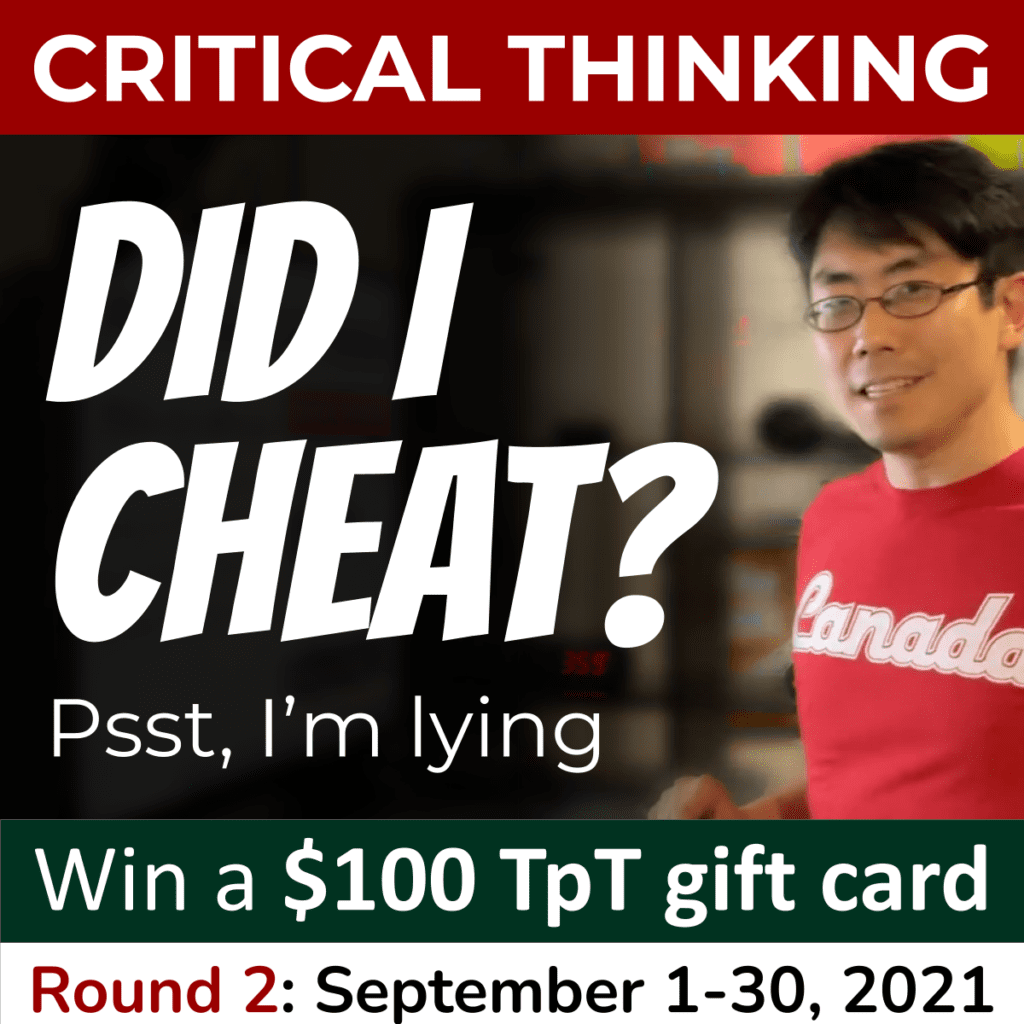
Did I Cheat Round 2 has begun!
- Teach this FREE lesson – Did I Cheat (round 2)
- Fill out this Google Form for a chance to win a $100 TpT gift card
Table of Contents: CURRENT Contest
Did I Cheat challenge (Round 2) Sep 1-30, 2021
- Start the school year by asking your students what is a lie?
- Next, show students this video and see if they can catch my lie
- Use this FREE powerpoint / slideshow lesson
- Finally, tell me what your students thought and you could win a Teachers Pay Teachers gift card!
PREVIOUS Contest:
Did I Cheat challenge (Round 1) Apr-Jun 2021
- Lesson overview
- Round 1 Powerpoint / Slideshow lesson that focuses on criteria of cheating
- Contest
- Odds of winning
Terms and Conditions:

Did I Cheat Round 2 (Psst I’m Lying)
Start the school year by asking your students what a lie is
Media Literacy lessons often focus on analyzing commercials, songs and movies.
That’s a great place to start.
But, we also need to think critically about what we see on YouTube, TikTok and other social media channels.
Use this free media literacy lesson at the start of the school year! Trick your students into critical thinking.
(Or, at least remind students how we already think critically in our day-to-day lives. Now, we just need to transfer those critical thinking skills to the classroom…)
MINDS ON!
Try these guiding questions to help your students brainstorm:
- How do you know what a lie is?
- If something is untrue, is it always a lie?
- Can someone be lying without knowing they’re lying?
- Can something be kind-of a lie? Can you give an example?
- Where do we draw the lie between a lie and a “kinda” lie?
- Does intent matter?
Figuring out if something is a lie uses critical thinking!
- What makes a lie, a lie?
- What’s the criteria of a lie?
- If a lie didn’t have this, then it’s not a lie…
- What is kind of like a lie, but it’s actually not a lie…
TEACHER PRO TIP:
Remind students this is a perfect example of how we think critically all the time in real life.
And yet, sometimes we don’t think critically and get scammed on the internet. (Here’s a free slideshow lesson about critical thinking and internet scams)
Or, other times, we ask our students to think critically when we read… and we get blank faces. (Here’s a free YouTube video lesson on the Evaluating Reading Comprehension Strategy.)
Next, show students this video and see if they can catch my lie:
Here’s a live stream video where I did an online random draw.
I gave away a $100 TpT gift card and a $50 TpT gift card.
Did I cheat?
- Maybe.
Did I lie?
- Absolutely.
Am I lying about lying?
- Well, now I’m just being difficult.
Use this free Back to School Critical Thinking activity to help your students think critically about lying
FYI: You can get your own copy of this slideshow lesson (Powerpoint or Google Slide) to edit for your classroom.
Download the critical thinking lesson (zipped file) for free here.
Did I Cheat Psst I’m Lying Round 2 Handouts
Here is a free 10 page independent worksheet package to help students do this task.
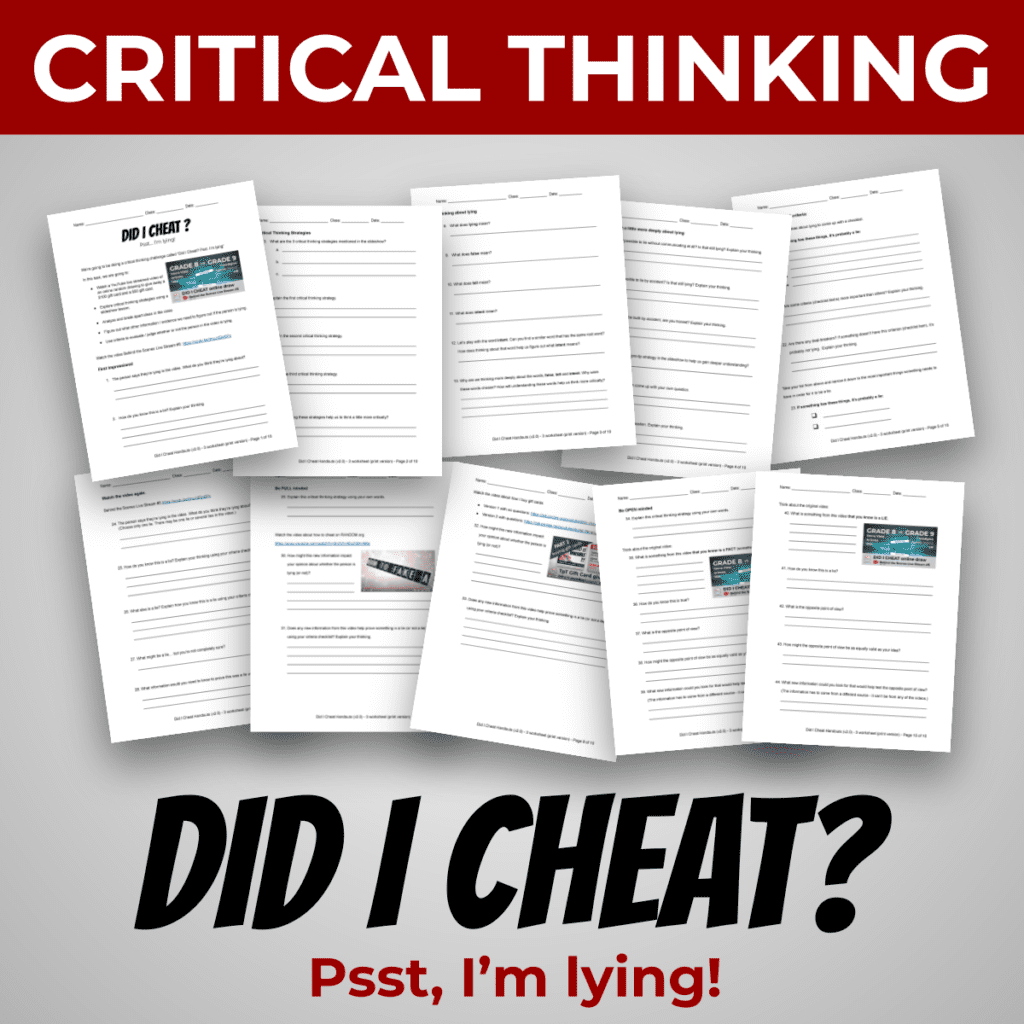
10 page independent worksheet package.
Help students use critical thinking to figure out the lie in my Did I Cheat “Psst I’m lying” challenge.
44 questions provide structured support.
Guide students through the critical thinking process:
- Minds on: First impressions
- 3 Critical Thinking Strategies
- Thinking about lying
- Thinking a little more deeply about lying
- Creating a list of criteria.
- Analyze the video. (Watch the video again.)
- Be full minded
- Be open minded
Finally, tell me what your students thought and you could win a Teachers Pay Teachers gift card!
HOW TO ENTER
PRIZES
OTHER THINGS TO KNOW
- The Did I Cheat “Psst I’m lying” Round 2 contest has started!
- Contest ends on Sep 30, 2021 (11:59 PM ET)
- Read the full terms and conditions.
Product Description
EASY PREP high interest critical thinking lesson: Can your students find the lie?
Students watch a live stream video of an online giveaway.
- Did I cheat? Maybe.
- Am I lying? Absolutely.
- Can your students figure out the lie? Let’s find out!
- Teach this lesson and you could win a $100 TpT gift card yourself!
NEW!
- Use the optional handouts to provide more structured support for students.
- 44 questions help guide students through the slideshow lesson and critical thinking process.
ABOUT THE LESSON:
Students explore 3 critical thinking strategies:
- USE CRITERIA to analyze and evaluate whether I am lying.
- Become more FULL MINDED and try to figure out what other information you need to figure out if I’m lying.
- Try to be more OPEN MINDED and wonder how the other point of view might be correct.
THINGS TO KNOW ABOUT THE LESSON:
- Distance Learning friendly: Edit the Microsoft Powerpoint™ and Google Slides™ files
- The slideshow is provided in the zipped file. You can preview the NO PREP slideshow lesson here: https://educircles.org/did-i-cheat/#round-2-powerpoint-slideshow
- Answer key NOT provided. This is an open-ended real world problem. Sample answers are not provided so that students are not guided towards the “right” answer.
This lesson includes a few slides and concepts from the 6Cs CRITICAL THINKING chapter of the GROWTH MINDSET 21st Century Learning bundle.
ABOUT THE Educircles “DID I CHEAT” challenge
Did I Cheat is a series of high-interest, real-world critical thinking activities designed for grades 6 and up.
The free slideshow lessons can be taught at any time. The lesson focuses on slightly different critical thinking examples.
Each new round of the Did I Cheat challenge is launched with a TpT gift card giveaway to make the lesson “more real”.
There are currently 2 rounds of the “Did I Cheat?” challenge
The current $500 TpT gift card giveaway is for ROUND 2 and ends on September 30, 2021.
ROUND 1 (APR – JUN 2021)
- The original “Did I Cheat?” slideshow lesson is available here: educircles.org/tpt/did-i-cheat-round-1
- The critical thinking lesson focuses on “cheating”
- how can we create a way to 1) cheat and get away with it or to 2) be more honest and transparent.
ROUND 2 Psst I’m Lying update (NOW – September 30, 2021)
- This version is available here: educircles.org/tpt/did-i-cheat-round-2
- The critical thinking lesson looks at the criteria for “lying” (instead of cheating)
- What additional info do we need to know to figure out if someone is lying?
Want a BIG HINT?
Try the Did I Cheat Psst I’m Lying challenge without using this extra piece of information…
(I mean, if you find this clue without opening the link below, that’s fair game. You’ll feel even more proud that you found this hidden clue from my other Educircles YouTube videos… oops, I’ve said too much.)
But, if you get really stuck, watch this video that was streamed live on Jul 30, 2021.
Warning: You’re going to watch this big hint and say, wait, what? That was the big hint? I don’t get it.
But, trust me. The lie is easier to find in this video.
Once you have that ah-ha moment and find the lie, you’ll be excited to go back to the original video for the Did I Cheat Psst I’m Lying.
And when you finally find the lie and can prove it, you’ll feel really proud.
And you’ll say, that was tough. But, yeah, it was a really good hint.
Good luck!

NOTE: Although the current Did I Cheat challenge with prize money is this one, please check out this free media literacy lesson (round 1). It has some great critical thinking for your students to sink their teeth into: did I cheat?
MEDIA LITERACY LESSON OVERVIEW
Students watch a video of a random online giveaway to determine if the person cheated.
The slideshow introduces 3 critical thinking strategies:
- USE CRITERIA to analyze and evaluate whether cheating occurred.
- Become more FULL MINDED to see how cheating can occur in live streamed online random draws.
- Try to be more OPEN MINDED and wonder how the other point of view might be correct.
Once students have analyzed the random draw and evaluated whether cheating occurred, students are asked to CREATE ways
- to make the online gift card giveaway more honest, fair and transparent
- to make the online gift card giveaway more dishonest and cheat
Think. Critically.
Use this FREE media literacy critical thinking slideshow lesson to start the conversation!
FYI: You can get your own copy of this Microsoft Powerpoint or Google Slide version to edit for your classroom. Download the zipped file here.
High interest End of Year critical thinking activity.
EASY PREP: Watch video. Class discussion.
Watch a video of my ONLINE GIVEAWAY.
Can your class figure out if / how I cheated?
Then, show them THIS VIDEO that explains one way I could have cheated!
Students need to think critically to prove if I did or didn’t cheat…
3 critical thinking strategies:
- USE CRITERIA to analyze and evaluate whether cheating occurred.
- Become more FULL MINDED to see how cheating can occur in live streamed online random draws.
- Try to be more OPEN MINDED and wonder how the other point of view might be correct.
Once students have analyzed the random draw and evaluated whether cheating may have occurred, students are asked to CREATE ways
- to make the online gift card giveaway more honest, fair and transparent
- to make the online gift card giveaway more dishonest and cheat
Things to know
- Distance Learning friendly: You can edit the Microsoft Powerpoint™ and Google Slides™ files (included in the zipped file.)
- Answer key intentionally NOT provided. This is an open-ended real world problem. Sample answers are not provided so that students are not guided towards the “right” answer.
- This lesson includes a few slides and concepts from the CRITICAL THINKING chapter of the GROWTH MINDSET 21st Century Learning bundle.
IMPORTANT: Clear steps for students NOT provided.
I know. That’s wierd, right? Why would I not provide clear step-by-step instructions for students on how to solve this problem?
You can see a view-only version of the complete 10 slide presentation here: https://educircles.org/did-i-cheat/
It just ends abruptly: How could I have cheated? How I could make this online contest more honest?
Afterwards, your students may ask if you made a mistake. Is that it?
Yup, that’s it.
And figuring out HOW to solve this problem… is part of the problem.
(If you’re stuck and looking for more specific guiding questions, email me at [email protected] and let’s work together to figure out something for your class!)
This is intended to be an authentic, meaningful, open-ended 21st Century Learning task for classes to engage with – where problems and solutions aren’t always handed to us on a silver platter.
The power of this challenge is to encourage digital literacy by getting students
- to think about whether video or images are “facts”
- consider how media is constructed or manipulated
- create ways to manipulate “the truth” as a construct
On one level, the goal is digital literacy and media literacy.
- Most people “know” how models in advertisements can be air brushed with photoshop. (Dove Evolution commercial)
- Not everyone understands how screenshots and video screen captures can be manipulated as well. (Do your students think they’re pretty good with technology? Have them try this digital literacy quiz!)
- By understanding the process, we can become more FULL MINDED when we try to think critically about the images and video we see.
On a broader level, the goal is to encourage students to think critically about the changing world we live in.
Think about it this way:
- It’s easier to come up with the “right” answers during an anti-bullying lesson.
- It’s harder to walk the walk and apply those principles outside of the classroom.
Likewise,
- It’s easier to think more critically when we’re in the classroom and we’re asked to think critically.
- It’s harder to walk the walk and apply those principles outside of the classroom.
By thinking about how we create media texts, hopefully students will apply that personal knowledge in life:
- We receive a text alert from Amazon or PayPal about a shipment or a payment. When we click the link in the text, we log into their website, but oops… it’s a fake website and we just gave them our login info.
- We receive a call from our bank and they know which branch we have our accounts at. There’s suspicious activity in our account because our computer has been hacked. They need to help by having us clear our account. Don’t worry, their computer technician can walk you through what you need to do to install remote access software. Then they can make sure you’re protected.
- A principal decides that a student should not be allowed to bring their service dog to class. The parents disagree but school board officials and specialists say that the student does not require this accommodation to learn. The parents feel this is discrimination because their child who has a recognized disability. So, the parents file a human rights complaint. The government human rights tribunal supports the school board’s decision to deny the boy their service dog. Is this discrimination? Is this systemic discrimination? (Read this article)
- Imagine 50 people voting for a representative. 20 support Blue. 30 support Green. A vote would have Green win every time. If we split the vote into districts, 5 districts with 10 people each, depending on how you group the voters, you can get different outcomes everytime. This is known as gerrymandering. Is this cheating? (video)
The hope is that students will start to use the skills from this challenge to think more critically about life and wonder about equities and inequities in other parts of their world.
FYI: This lesson is part of the Growth Mindset 21st Century Skills Mega Bundle.
- Get the bundle
- Learn more about the bundle
PRIZES available to be won:
Reasons why a contest entry response might be invalid:
Invalid Entry #1:
- A personal gmail account was used without pre-approval. Teachers at private schools who do not have a school email address need to contact me for verification BEFORE entering the contest. (See rules below.)
- The answer to QUESTION #2 in the google form did not create a way TO CHEAT in this online giveaway WITHOUT people finding out you cheated. (Slide 11). “They decided that we would try to get it how hard we can so we could get more work for free because we love teachers pay teachers and the help me so much.”
A few notes about authenticity and transparency:
- Because the prizes are high-value gift cards, I will do a live stream video drawing
- I will use random.org to determine the results.
Watch a video replay of the last live stream contest drawing!
Watch on YouTube: https://youtu.be/H2J918yS4Wk
Did I Cheat TpT Gift Card Giveaway Terms and Conditions
Some things to know about the Round 2 edition of the DID I CHEAT contest (Sep 1 to 31, 2021🙂
- No purchase necessary to win.
- Open to people 18 years or older who are currently employed as educators.
- Void in Quebec, and anywhere this promotion is prohibited or restricted by law, or where requirements would be required but have not been met. All applicable federal, state and local laws apply.
- Teachers must download and teach the free lesson available here: Did I Cheat Round 2.
- Contest officially begins on Sep 1, 2021 however you may enter the contest before the official start date once the Google Form goes live.
- Contest closes Sep 30, 2021 at 11:59 PM (ET).
- Winners determined by random draw during live stream video on Fri Oct 8, 2021 at 11 AM (ET).
- Prizes come in the form of TpT gift cards and cannot be substituted. TpT gift cards can be used to purchase anything on the Teachers Pay Teachers marketplace. (You do NOT need to buy something from my Educircles store.)
- Odds of winning depend on the final number of entries received.
- Winners will be notified that they have won via email. Winners must reply to confirm their email address is active in order to receive a second email which will include their TpT gift card code. Winners may need to complete a mathematical question to qualify for their prize.
- You may only enter once in this Round 2 Did I Cheat challenge. Each person is only eligible to win one gift card in this contest. You may still enter this contest even if you have won in previous Educircles challenges.
- Entries may be disqualified if they are not in the spirit of this contest as determined by Mike Fuchigami / Educircles.org. This includes entries to test the google form, duplicate entries, entries with duplicate answers, incomplete entries, spam-like answers, nonsensical answers or simplistic and/or one-word answers. For example, (1) The lesson went well. (2) No, there was no lie. (3) You don’t need any extra information.) In an effort to be transparent in this process, if any entries are disqualified, the nature of the disqualification will be disclosed (i.e. please don’t use one sentence answers: The lesson went well.), however Educircles is not obligated to inform the teacher submitting a disqualified ballot that their ballot has been disqualified.
- You must use your school email address in order to participate in this contest. This is to confirm that you are a teacher and to prevent people from entering multiple times using personal accounts. Any entries from non-school email accounts (gmail, yahoo, hotmail, etc) or student school email accounts will be disqualified. Your email address will be used for the purposes of this contest and will NOT be added to any mailing lists. NO SPECIAL EXEMPTIONS from using a school email address will be made in this ROUND 2 of the Did I Cheat Challenge.
- By submitting a contest entry, you agree that any content or information provided by you on the contest form is your original work and otherwise does not infringe the intellectual property rights of any third parties.
- If you win, your name, city / country, school you teach at, grade(s) you teach, your answers and the amount of the TpT gift card won may be posted on Educircles.org, SEOT.ca, the Educircles TpT Store, social media, and/or other platforms. Unless prohibited by applicable law, your contest entry constitutes your permission to use your name (First Name, Last Name), address (city / country), and your entry content in any and all mediums, in perpetuity, in any manner Educircles deems appropriate (including for testimonials, publicity, and other promotional purposes) and for publicity purposes without any compensation to you or any review or approval rights, notifications, or permissions; and constitutes your consent to disclose your personally identifiable information to third parties (including, without limitation, placing the winner’s name on a winner’s list).
- Did I Cheat Round 2 Terms and Conditions – Version 2021-07-17
Contest Change Log
- Round 1 Terms and Conditions first posted on 2021-04-07
- Round 1 Terms and Conditions updated on 2021-04-09 to allow special exemptions to the school email address requirement on an individual basis – for example, teachers at private schools who are not provided with a school email address.
- Round 2 Terms and Conditions updated on 2021-07-17
